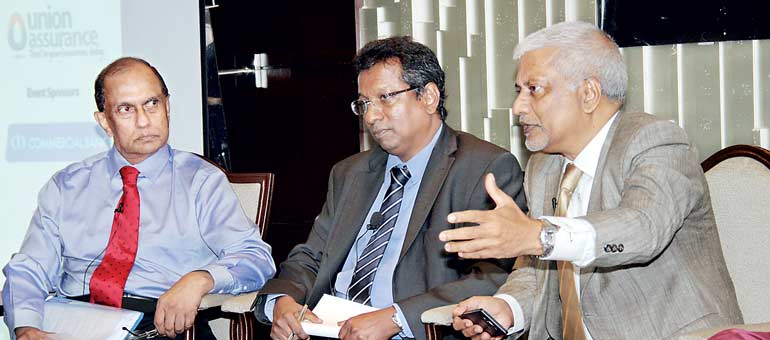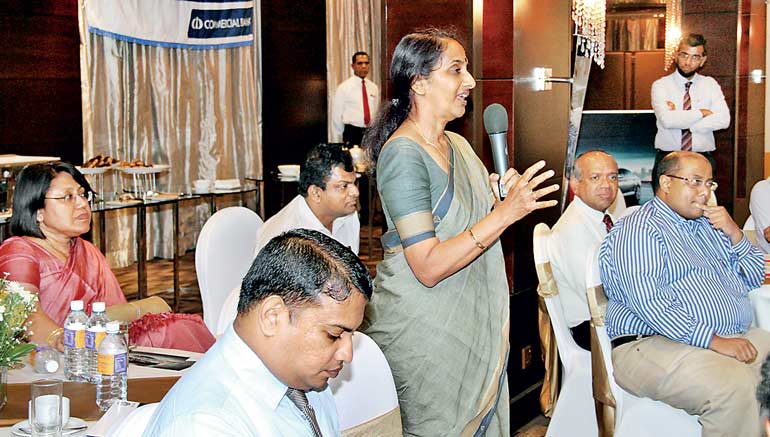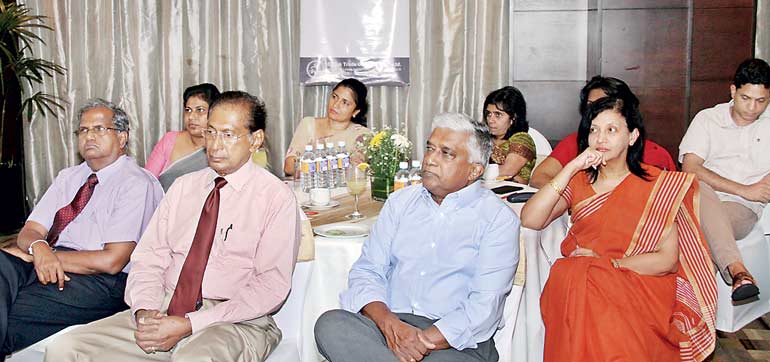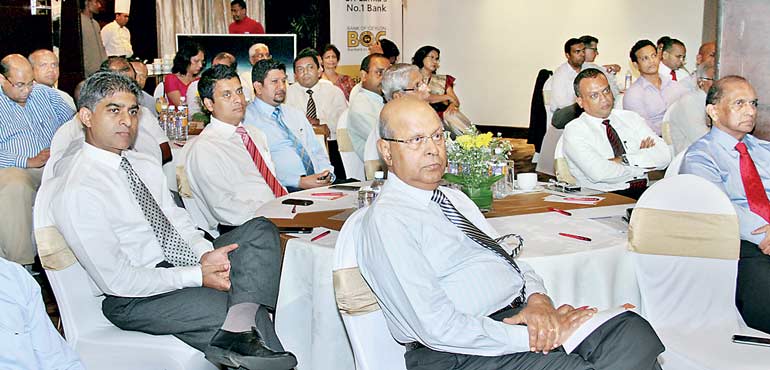Sunday Feb 15, 2026
Sunday Feb 15, 2026
Friday, 24 July 2015 00:05 - - {{hitsCtrl.values.hits}}

From left: John Keells Holdings Group Finance Director Ronnie Peiris, Transparency International Sri Lanka Executive Director and Attorney-at-Law J.C. Weliamuna, Founder-Chair of LIRNEasia Rohan Samarajiva, Statistician and Former Assistant Governor of the Central Bank of Sri Lanka, Dr. Anila Dias Bandaranaike and Ambassador and Head of the European Union Sri Lanka, David Daly
The issue of corruption is unfortunately not new to the Sri Lankan landscape, as its effects have been thoroughly felt for decades in both the public and private sector, and over the years, corruption has kept rearing its ugly head in a myriad of new and worrying ways. At its latest Power Evening, the Sri Lanka Institute of Directors tackled this highly topical problem, through an eminent panel of speakers representing the public and private sectors, along with insights from a legal and international standpoint.
To enlighten the gathering on what businesses, directors and managers should know about corruption were Ambassador and Head of the European Union Sri Lanka, David Daly, Statistician and Former Assistant Governor of the Central Bank of Sri Lanka, Dr. Anila Dias Bandaranaike, Transparency International Sri Lanka Executive Director and Attorney-at-Law J.C. Weliamuna, John Keells Holdings Group Finance Director Ronnie Peiris and Founder-Chair of LIRNEasia Rohan Samarajiva as panel moderator.

European perspective
The power evening commenced with a keynote address delivered by Ambassador David Daly who shared some of the good practices and standards adopted overseas, from a European perspective. Diving into the issue with some illuminating statistics, Daly revealed that the European Commission has estimated that corruption costs the European economy around €120 billion a year, which is just under 1% of EU GDP.
“In a recent public opinion survey conducted across the EU, 8% of Europeans say they have experienced or witnessed a case of corruption over the last 12 months. In a recent business survey, there were huge variations between member states in perceived corruption, with 99% of Greek companies citing corruption as opposed to only 10% of Danish ones. Furthermore, the smaller the company, the more often corruption and nepotism appear as a problem for doing business,” he noted.
Nonetheless, EU countries fare fairly well in the Transparency International ranking and most member states are in the top 50. Despite this, Daly observed that the GFC has demonstrated the pressing need for further structural economic reforms in many countries as well as the need for austerity measures in some.
“We cannot afford to have resources wasted through corruption. Similarly, globalisation has shown the need for companies and economies to constantly improve their competitiveness. However, the higher the corruption, the lower the competitive edge because amongst other things, investment – specifically foreign direct investment – is discouraged by prevailing corruption.”
He then drew out three issues which must be addressed in order to tackle corruption – firstly, having high standards and legal frameworks, secondly, having the political will to ensure compliance with those standards and thirdly, having properly resourced independent compliance institutions as well as properly resourced public services.
Daly stressed on the need for well-defined defences for corrupt practices and deterred sanctions, driven by a political will to ensure that the standards embodied in the legislative framework are actually complied with. “Public administration must become more transparent through measures such as the freedom of information. This is perhaps especially important with regard to the award of public procurement projects,” he added.
“Equally, politicians must refrain from the temptation of trying to interfere with the functioning of the independent monitoring compliance or enforcement bodies, be they the police, the judiciary or public audit bodies.” Daly went on to highlight the importance of properly resourced institutions and well-paid staff.
Turning to the actual question – saying “no” to corruption and what can corporates do, Daly started off simply – don’t pay bribes will be a start. “Corporates can refrain from corrupt practices and collectively agree on high ethical standards and this can include aligning yourself with best practices elsewhere,” he stated.
“My sense is that you already do this. I’ve seen many links between Sri Lanka and European countries like UK, France, Germany, Italy and others in terms of both business links but also academic links,” Daly noted. “For example, I understand that many Sri Lankan accountants qualify with UK qualifications. Alignment on these high standards is I think a great advantage.”
Another point he stressed on was for the corporate sector to call for and support the Government in strengthening key public oversight institutions. “In your conversations with Government, you can raise these issues when discussing how to attract FDI. Clear and consistent rules, transparency of procedures and various other issues are crucial to creating a friendly business environment attractive to others.”
Petty and grand corruption
The keynote address was followed by some insights from the panellists themselves, commencing with Founder-Chair of LIRNEasia Rohan Samarajiva, who started off with the legal definition of corruption in Sri Lanka, expressing the opinion that what law we’ve got, we should implement and then we should amend it.
He then looked at what is meant by petty corruption, defining it as: “There were always touts trying to get money from you at the passport office or we would call a buddy from university and get around the whole system.”
“But today, taking the Department of Immigration and Emigration, I don’t think there is petty corruption in the case of honest people getting honest passports. Why? Because we have systemised it, made the requirements transparent and in addition, we have taken the speed money problem and formalised it. This is one of the great achievements of governance in this country.”
Samarajiva then went on to broadly define grand corruption, citing a possible example in the telecom regulatory sector, in the issue of broadcasting licenses. “It is a monopoly – not everyone can get broadcasting licenses or the frequencies. Discretion – tremendous, no transparency – potentially, this is high.”

Corruption: A rational response?
Transparency International Sri Lanka Executive Director and Attorney-at-Law J.C. Weliamuna too started off his insights with a definition of corruption, stating one that has evolved through Transparency International: “Corruption is the abuse of entrusted power for personal gain.”
He too delved into the issues of petty and grand corruption. “Petty corruption is a very interesting theme where you basically give money for some services. If you are copped you pay Rs. 100. Grand corruption goes beyond that, affecting the national economy, national policies and so on but generally it involves a huge amount but there is always confusion as to which is worse.”
“No doubt both are bad but when it comes to the amount there was a debate that grand corruption has a bigger value but studies show otherwise. It is actually petty corruption that has a higher frequency of occurrence, millions of times daily. Sometimes, grand corruption that happens once in a way doesn’t mean that the harm is any different but with petty corruption the issue is that it cuts across our culture and is internalised within ourselves. People think corruption is right because petty corruption is tolerated,” he noted.
He observed that grand corruption is no longer a local issue – it goes beyond jurisdictions and is cross border mostly because perpetrators accumulate such a huge wealth that they cannot spend it in one country, adding that to cover up the grand corruption, a global network is needed. Weliamuna cited the example of the former dictator of Panama, Ricardo Martinelli, to drive his point home.
He then shared some findings from latest research, commencing with the economic argument to justify corruption, which everybody thought was right earlier. It says that economically, corruption is justified because it gives opportunities to bypass inefficient regulators and red tape. Therefore, it allows the private sector to correct government failures. That was the justification forcefully made and 10% of research still upholds this argument.
Based on specific cases, now there is a new volume of research in this area, he revealed. One argument says that rather than promoting economic growth, what corruption does is it mitigates the impact of weak institutional frameworks. Second is while corruption can counteract the effect of overregulation, it supports the greasing the wheel hypothesis but it does not necessarily increase economic growth.
“There is nobody anywhere in the world that can show that corruption has contributed to economic growth in that sense,” he added. Weliamuna concluded by noting that although corruption may help reduce short term costs induced by administrative process and cumbersome red tape, it has long term detrimental effects on operations of companies and a corrosive effect on overall governance and rule of law.

A private sector angle
John Keells Holdings Group Finance Director Ronnie Peiris looked at the issue of corruption from a private sector angle. “I would like to say that corruption is like any other economic transaction. You’ve got a supply and a demand. The demand is when someone demands a price for the service that he is willing to give by a means which is not in keeping with standards or procedure, and the supply is that when someone else is willing to pay that price for receiving that service.”
“The private sector needs to take collective action if we are to stop this cancer spreading through our entire system,” he stated strongly. Peiris listed, from a private sector view, some causes for corruption –one being unclear ambiguous frequently changing laws and regulations. He then explored why people in the public sector engage in corruption, some of the reasons identified being the lack of accountability, transparency and extremely low wages.
He observed that even if there are laws, the way that these laws are enforced depends on who you’re enforcing them on and that also leads to frustrations and that in turn leads to corruption, as they are enforced depending on the connections and other nepotistic views that you might have.
“In this environment, I think I would be speaking for the private sector – we have taken various steps to try and minimise the supply side of corruption. Some of these measures are externally induced through standards. In private companies, there is a big drive for better corporate governance, transparency and accountability. I’m not saying everyone is doing it at the same level but there is certainly a drive towards it,” Peiris stated.
He further noted that very often when the private sector has a storekeeper looking after Rs. 100 million worth of goods and earning just Rs. 50,000 – he’s ripe for corruption. “In procurement procedures, I think we take a lot of steps – procurement councils, good MIS, using Z scores to find outlier transactions, using ERPs, forensic digital forensics – all sorts of things happening in the private sector,” he said.
Whistleblowing has also been very successful, he added. In the last year alone, there were about five or six whistleblowing instances where it has led to finding in time certain corrupt activities happening and that also has been one measure of minimising corruption. Access to information is absolutely vital, Peiris stressed. “Promote independent media – we as the private sector need to encourage technical reporting, people who have a nose to be able to smell out certain corrupt practices that may be happening in the private sector or public sector, and adopt voluntary standards because if we don’t, our standing in the eyes of investors and the investment community will be eroded.”

Collective action
Rounding off the insights from the panellists was Statistician at the Central Bank of Sri Lanka Former Assistant Governor Dr. Anila Dias Bandaranaike, who addressed the issue from the viewpoint of economic development. She noted that whether petty or grand, corruption creates huge inefficiencies, leading to loss of revenue or adding to expenditure which will affect the bottom line, and in turn resulting in the misallocation of human, financial and material resources.
“Many said we need collective action. Regulations and regulatory bodies are there but unless there is a commitment and will to adhere to those, and unless those of us who are in a position are willing to sacrifice the jobs that we do in the interests of ethics and getting rid of this scourge, we are not going to get anywhere,” she stated, adding that if the checks and balances are weak, and the systems of accountability are weak, the fight against corruption is not going to get anywhere.
“I believe the “why” of the corruption is because there is a lack of awareness about the short term versus the long term benefits. And the “I” versus “we,” mentality, whether it is in business or politics or among individuals, and the ingrained culture of patronage that we have in this country, a lot of that is what leads to the corruption,” Bandaranaike said.
She called for collective action among the private sector, to stand together through the various chambers or representative institutions such as the SLID, and to push for supporting existing regulatory institutions and frameworks and strengthen them, by collectively standing up against corruption and pushing for transparency. She stressed on the need for transparency even about the benefits that come with key positions both in the private and public sectors – such as additional benefits senior officials, directors and CEOs receive in terms of housing, rent, paid holidays, cars, fuel and other allowances etc.
However, she also pointed out that none of this will work even if all the information is available, unless citizens analyse such information and raise pertinent issues. Drawing upon Sri Lanka’s Fiscal Management Act as an example of this she stated that: “It basically became a mockery – no one analysed or raised issues when fiscal conditions were weak - The Act had no teeth because the citizens didn’t open their mouths and shout and the media put trivial stuff out, instead of real hard analysis of serious fiscal problems.”
“We are all collectively responsible. I found the emerging concept of “open government partnership” quite interesting and relevant to what we are discussing here – the idea is that there is openness between government and citizens to make things go better. Finally, my message is collective action.”
|
|